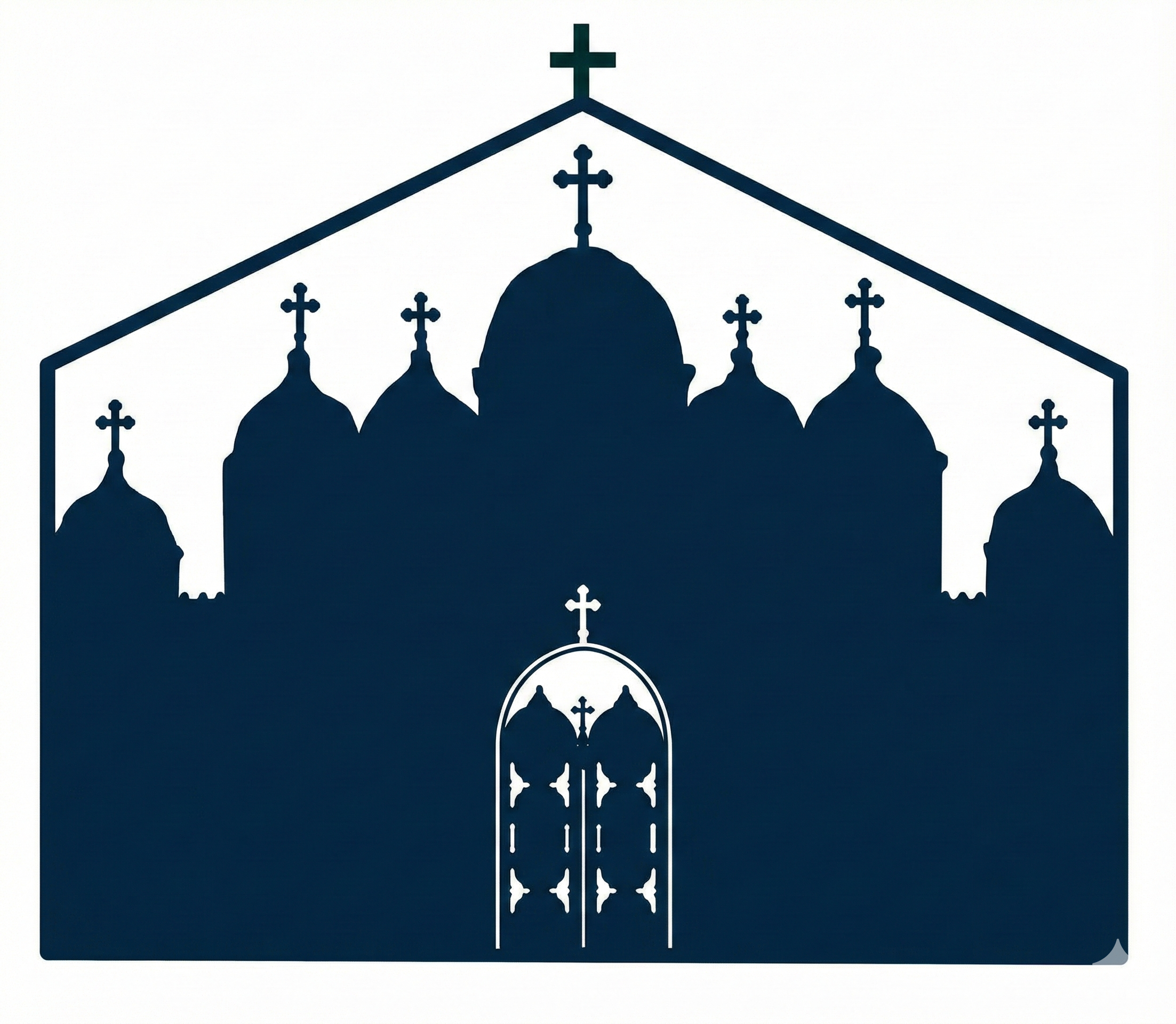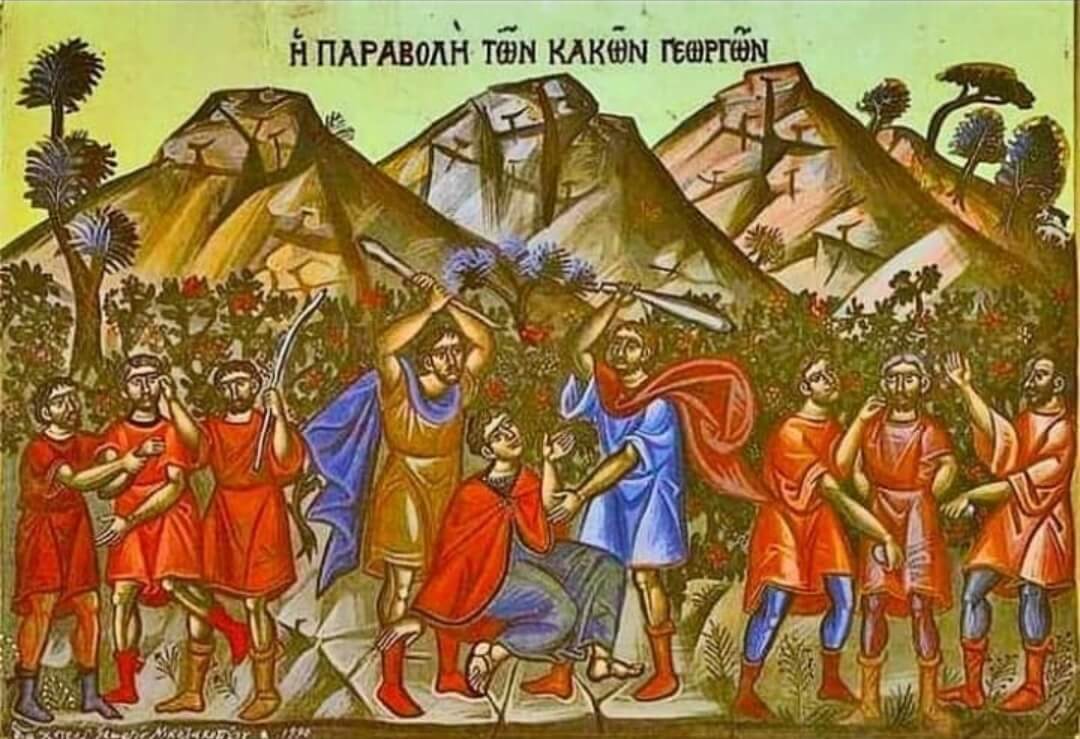Today’s Sermons (Same Post)
Sermon by Father George (Osaka Church)
Matthew 21:33-42, September 7, 2025, Osaka Church
In the Name of the Father, and of the Son, and of the Holy Spirit
There is a word, “human.” This word seems to resonate with people because, consciously or unconsciously, many people today consider “humans” to be the source of all value. Humanity has now become sacred and inviolable. The parable of Jesus that we just read pinpoints the very idea that the “human” is of greater value than anything else.
A certain man planted a fine vineyard and left it to farmers to manage. When he returned, he sent his servants to the farmers to gather his harvest. The farmers, plotting to take all the harvest for themselves, killed each of the servants one by one. Finally, the master sent his beloved son, hoping that the farmers would respect his own son, but the son too was brutally murdered. In this parable, the Lord is predicting that the Jews, who were supposed to be God’s people, would persecute the prophets who spoke God’s warnings, one after another, and eventually even kill the Savior sent by God, His only Son, Jesus Himself.
However, this parable can be interpreted from a broader perspective.
What exactly did these wicked farmers do? Wasn’t it usurpation and embezzlement? The owner surrounded his vineyard with a fence to protect the farmers from outside enemies, equipped it with facilities for fermenting wine, and even built a tower for watch and rest, and gave it to the farmers. This overlaps with the truth of God’s creation of the world, as revealed at the beginning of the Book of Genesis in the Old Testament. God created the world, brought light to it, stretched out the firmament, laid out the land, and adorned it with various plants. He scattered the sun, moon, and countless stars across the vast, boundless universe. He filled the seas with living creatures, the sky with birds, and the land with beasts. Finally, God created humans. Humans were blessed and told to “be fruitful and multiply and replenish the earth and subdue it, and have dominion over the fish of the sea and the birds of the air and over every living thing that moves on the earth.” Like a farmer who was given everything he needed to tend a vineyard…
However, just as these farmers did, humans have stolen the world from God. Every “thing” and phenomenon in the world has been incorporated into human plans, and everything has been described as a resource. Resources that support human life, fulfill human desires, and serve human ambitions. Even humans can become resources or means to fulfill each other’s desires. The various mysteries that this world was designed to provide for us—to marvel at God, praise Him, give thanks to Him, and learn to love Him—have fallen prey to humans’ insatiable desire for material things and exploration, and have been revealed one after another. Just as the master’s servants were killed one after another.
Ultimately, humans have elevated themselves to the status of “sacred and inviolable.”
We must give back what we have stolen. Rather than viewing the world as a “resource” to serve humanity, we must once again restore it as a place where humanity can serve God. In the parable, the farmer’s job was to make wine. This teaches us a very important lesson. Our service does not involve breaking the world down to its smallest elements, recombining them to create new power and a new world, and competing with God. Think of nuclear development and genetic engineering. Our work must be humble, like that of making wine, watching over the mystery of the world given to us by God, encouraging its workings, and brewing it into something rich and flavorful. We must also know everything as a “gift” and once again make our lives and the world an offering of gratitude to God. Christ first opened up the possibility of this original human way of life by offering himself to God on the cross.
In the Liturgy in which we gather now, a service called “Eucharist” (Thanksgiving) in Greek, we offer back to God the bread and wine made from the wheat and grapes that God has given us, and then give them back to us as God’s gifts, His body and blood. This world is still a place where humans are arrogant and overbearing. However, in the gathering that is the Church where Christ has been reassembled, gratitude to God restored by Christ, the communion of God’s love and human gratitude that will eventually be completed in perfection at the end of the world, has begun as the “life” of the Church, as daily worship, and as communion with God in which we “offer” bread and wine and “receive” it as God’s body and blood.
Sermon by Father Basil Sugimura (Visiting from Kyoto)
Sermon on the 13th Sunday, Matthew 21:33-42
Father Basil Sugimura, September 7, 2025
In the name of the Father, and of the Son, and of the Holy Spirit.
Today’s Gospel is Christ’s parable of the “Vineyard and the Farmers.” The owner of the vineyard hired farmers to help him. He had to leave the field for a long time. As harvest approached, the owner sent out his servants, but they were lynched and killed by the farmers. The owner continued to send more servants, but finally, he sent his own son as a representative, only for the farmers to kill him as well.
This parable has several religious themes, but today I will focus on the difference between “rule” and “control” and discuss why the farmers resorted to such cruelty.
Because the master was away for so long, the farmers began to believe that what they had been given by their master was something they had earned through their own efforts, and they mistakenly believed that the farm that the master had entrusted to them and put in charge of managing was their own property. Genesis 1:28 records that God “gave humans dominion over the rest of His creation.” The word “Kavash ya Radha,” which is translated as “subdue and have dominion over the earth,” originally had a pastoral meaning within God’s order of salvation: “direct, care for, and nurture toward the abundant life of God.” However, this meaning was misinterpreted and distorted within the human sphere. Before they knew it, humans forgot that this world exists under the light and order of God’s grace, and that it is moving toward that light and order, and they mistakenly believed that they could control it and use it according to their own desires. In other words, just like the farmers, humans have made this world “theirs.” However, the resources, environment, talents, and positions in this world are all gifts given to us from God; they are partners in life and should work together toward God’s life. Therefore, if they are managed for the right purpose, they will be beneficial, but if they are used in the wrong way, good results will never be achieved.
Therefore, the story of the farmers described in this diary is by no means unrelated to us. We humans are all vulnerable to desire. In particular, the desire to possess and control causes us great suffering until the end. While we are suffering from these desires, there is still hope. When we finally forget even the suffering and become dominated by our desires, we will no longer notice the light of the Gospel message. This is because the desire to control causes humans to want to do as we want with others and nature, and they become trapped in a way of life and way of thinking that begins and ends with themselves. In other words, they become self-contained. As a result, they become unable to hear the voices of others speaking to them.
In the Hebrew world, the ability to “listen” is highly valued. Listen to the voice of heaven, hear the voice of a priest praying, hear the voice of nature… By listening, we come to know the person speaking more deeply. The attitude of listening is the beginning of love.
That said, it is very difficult to immediately give up the desire to control. But we humans can grow and change toward goodness (love). God has given us the power to do so. Whether we make use of this power or not is up to our will as humans. God has entrusted our lives to us, not to control others or nature, but to live and grow together in accordance with God’s image, which is love. This is not “control,” but “management” through love. Management, for example, means taking care of one’s body when referring to “health management.” Consideration is an attitude of love. Therefore, management means considering others. Consideration leads to respect for others. Each of us has been given a place to work on this earth by God, and we live in relationships with one another. We must live in right relationships. These are relationships in which we bring out the best in each other, rather than dominating others. Domination will eventually destroy others, but stewardship brings out the best in us through harmony.
This week, let us all strive to be considerate of others in the places of our assigned work, and to carry out our duties in loving relationships.

